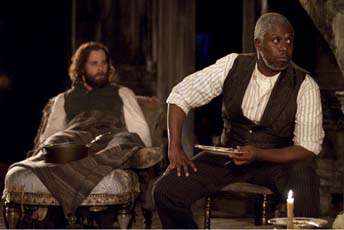
Paulanne Simmons
God and Ghosts in "The Whipping Man"
"The Whipping Man"
Directed by Doug Hughes
Manhattan Theatre Club
At New York City Center-Stage
131 West 55th Street
From January 13, 2011
Tues. at 7pm, Wed. at 2pm and 8pm, Thurs and Fri. at 8pm, Sat. at 2pm and
8pm, Sun. at 2pm
Tickets: $80 (212) 581-1212
Closes March 27, 2011
Reviewed by Paulanne Simmons Feb. 16, 2011
In the songs and prayers of African-American slaves one frequently finds
references to the manner in which God freed the children of Israel from
their Egyptian captors. Doubtless, it was a story that gave hope to a people
that had lost its rights and its freedom. So it's easy to see why playwright
Matthew Lopez thought the parallels might make for an engrossing play. And
in many ways he was correct.
"The Whipping Man," Lopez'z imaginative melding of the Jewish and African-American liberation stories, is directed by Doug Hughes. It features Jay Wilkinson as Caleb, the scion of a Jewish slave-holding family; Andre Braugher as Simon, his father's old and faithful slave; and Andre Holland as John, a younger slave who was once Caleb's bosom pal. The three men are connected by a common history, but even more by a common religion. Masters and slaves in this unusual story are all Jewish.
 |
| THE WHIPPING MAN-- Jay Wilkison, Andre Braugher, Andre Holland in "The Whipping Man". Photo by Joan Marcus. |
When the wounded Caleb returns and bursts into his burnt out home, he finds Simon and John are its only occupants. Simon is waiting for the return of his wife and daughter, and Caleb's father, who has promised to give him money to go to the North. John is burglarizing all the deserted homes in the neighborhood.
Simon, who is something of a surgeon, amputates Caleb's leg with John's help (this scene is not for the faint-hearted), and while the patient is recovering, realizes that Passover is fast approaching. Despite Caleb's refusal to join in (the war has turned him against religion) and John's grumbling, Simon decides to hold a makeshift Seder. It is during this Seder that the family's awful secrets and the brutal inhumanity of slavery, as symbolized by the shipping man, are fully revealed.
"The Whipping Man" is so masterfully directed and so well acted it's easy to overlook some of the major flaws in the play. Lopez has created powerful dialogue for his characters, dialogue filled with pathos and humor. And John Lee Beatty's Gothic set coupled with Ben Stanton's atmospheric lighting heightens the intense emotional impact of the drama.
 |
| THE WHIPPING MA -- Jay Wilkiso and Andre Braugher in "The Whipping Man". Photo by Joan Marcus. |
Yet annoying questions keep emerging in the back of one's mind. History tells us that there were a few Jewish slaveholders in the South. But slavery presents a special problem for the observant Jew. The Old Testament certainly allows for slavery but not the kind of slavery practiced in the South. And while Christians can and do ignore many parts of the Old Testament, Jews would not find this so easy.
Not only did Caleb's father own slaves, he encouraged them to become Jewish and allowed them to conduct their own Seders. Perhaps he forgot that most important line Jews say at every Seder: "This year we are slaves; next year may we be free men." And Simon, who was unable to read any language, somehow figured out how to translate the Seder (which was undoubtedly conducted in Hebrew) into perfect English.
There are many other questionable details in the play, but to go over them would reveal too much for those who want to go see it. It also is to risk being called petty and nit-picking.
But the very real inconsistencies in "The Whipping Man" are no small thing. The play deals with two groups of people that have an uneasy relationship, one fraught with misinformation on both sides. And the search for real facts will lead one to a host of anti-Semitic sites on the Internet.
Lopez has done quite a bit of research for this play. His knowledge of Judaism is admirable. But it is to some extent superficial. He charges in where he should tiptoe.
Thank goodness, there is no censorship in the United States.
This, however, means that playwrights need to be even more vigilant that
what they write does not misrepresent history in a way that could have harmful
results.

| museums | NYTW mail | recordings | coupons | publications | classified |